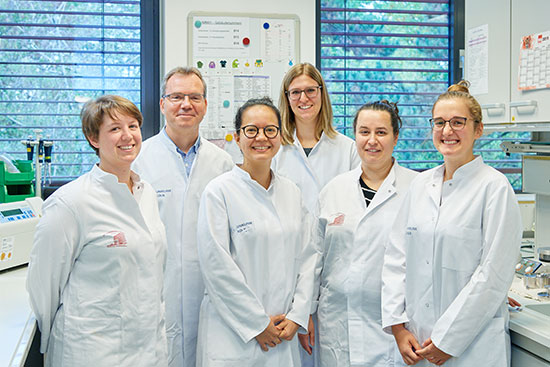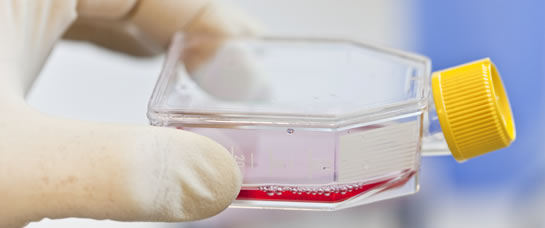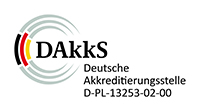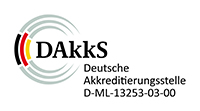AG Klimka
Forschungsgruppe -Antibakterielle Impfstoffentwicklung-
Deutsches Zentrum für Infektionsforschung (DZIF)
Group Leader: Dr. Alexander Klimka
Phone: +49 221 478-32194 [Email protection active, please enable JavaScript.]

Vordere Reihe v.l. Janina Kahl, Maria Salomé González Rodríguez, Dr. Sonja Mertins, Mariella Martoccia. Hintere Reihe v.l. Dr. Alexander Klimka, Liza Rummler
Co-workers:
Maria Salomé González Rodríguez (-32236), [Email protection active, please enable JavaScript.]
Liza Maus (-32219, [Email protection active, please enable JavaScript.])
Alumni:
Fabienne Becker
Julia Berger
Saskia Burkart
Dr. Alex Chung
Vanessa Ditt
Svenja Hagen
Janina Kahl
Sascha Königsfeld
Mona Leinen
Marion Lorenz
Larissa Michels
Dr. Anne Nicolai
Julia Reider
Dr. Katja Sabel
Eva-Maria Thelen
Sandra Weitz
Research Topic:
Antibody-based therapeutic
Brief description in German:
Als wichtiger Bestandteil des Immunsystems vermitteln Antikörper durch ihre spezifische, starke Bindung an ihre jeweilige Zielstruktur entscheidende Prozesse bei der Bekämpfung von Pathogenen. Bei der Entwicklung von alternativen Therapien gegen die unterschiedlichsten Erkrankungen macht man sich oftmals die Spezifität von Antikörpern zunutze. Durch die Hybridoma- bzw. "Phage Display"-Technologie ist es möglich, vollständige Antikörper bzw. Antikörperfragmente mit den gewünschten Bindungsspezifitäten zu generieren.
Ziel unserer Forschung ist es mittels dieser Technologien Antikörpermoleküle zu erzeugen, gegebenenfalls mit Effektormolekülen zu fusionieren und als alternative Immuntherapeutika zur Anwendung zu bringen. Im Einzelnen beschäftigen wir uns derzeit mit folgenden Projekten:
- Produktion von Staphylococcus aureus-, Klebsiella pneumoniae-, Neisseria gonorrhoeae- und Acinetobacter baumannii- spezifischen Proteinen zur Generierung von Impfstoffen und Antikörpern zur Detektion, Prophylaxe und Behandlung von Infektionen
- Modifikationen von Bakteriophagen und viralen Partikeln, um als Vakzine oder Vektoren für die Gentherapie genutzt werden zu können.
- Selektion von Antikörperfragmenten gegen infektiologisch interessante Zielstrukturen.
- Generierung von monoklonalen Antikörpern für die Entwicklung von diagnostischen Kits zur Detektion von mikrobiologischen Zielstrukturen, wie Biomarkern und Resistenzmarkern.
Antibodies are the key-molecules for specific therapeutics against numerous diseases. One challenging task in this context is the provision of target-specific antibodies. Hybridoma Technology and Phage Display proved to be successful tools to provide monoclonal, full-size antibodies or recombinant antibody fragments, respectively.
Our goal is to apply and further improve these techniques to retrieve binding moieties against interesting targets and to modify them in such a way, that they can be used as alternative therapeutics in immunotherapy and vaccination studies.
The specific aims of our research are:
- Production of recombinant S. aureus, K. pneumonia, N. gonorrhoeae and A. baumannii proteins and corresponding monoclonal antibodies for active and passive vaccination against infections.
- Generation of monoclonal antibodies for the development of diagnostic kits to detect microbial target structures, like biomarkers and antibiotic resistance markers.
- Modification of bacteriophage and viral particles to become vaccines or vectors for gene therapy.
- Selection of antibody fragments via phage display to select for inhibitors of Staphylococcus aureus infections.
Selected recent publications (2005 - date):
Klimka A, Mertins S, Nicolai AK, Rummler LM, Higgins PG, Günther SD, Tosetti B, Krut O, Krönke M. Epitope-specific immunity against Staphylococcus aureus coproporphyrinogen III oxidase. NPJ Vaccines. 2021, 6(1):11
S. Mertins, P.G. Higgins, M.G. Rodríguez, C. Borlon, Q. Gilleman, P. Mertens, H. Seifert, M. Krönke, A. Klimka. Generation and selection of antibodies for a novel immunochromatographic lateral flow test to rapidly identify OXA-23-like-mediated carbapenem resistance in Acinetobacter baumannii. J Med Microbiol. 2019, 68(7):1021-32
M. Asadi-Ghalehni, M. Ghaemmaghami, A. Klimka, M. Javanmardi, M. Navari, M.J. Rasaee. Cancer immunotherapy by a recombinant phage vaccine displaying EGFR mimotope: an in vivo study. Immunopharmacol Immunotoxicol. 2015, 37(3):274-9
Klimka A, Michels L, Glowalla E, B. Tosetti, M. Krönke and O. Krut. Montanide ISA 71 VG is advantageous to Freund’s adjuvant in immunization against S. aureus infection in mice. Scand. J. Immunol. 2015, 81(5):291-7
Y.-S.A. Chung, K. Sabel, M. Krönke and A. Klimka. Gene transfer of Hodgkin cell lines via multivalent anti-CD30 scFv displaying bacteriophage. BMC Mol. Biol. 2008, 9:37




